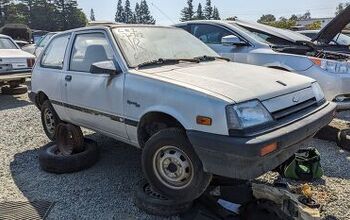Will Visteon Drag Ford Down?
The Ford-as-Survivor meme has properly taken hold in the mainstream media. But how much of the cheerleading is wishful thinking? Matt Debord of thebigmoney.com figures there’s no reason to get to excited about Ford’s $300 million stock offering, and indeed Ford’s stock is down considerably today. But Ford’s troubled supplier Visteon turned a $2 million Q1 profit, insists the Freep. The first quarterly profit since 2006! What you have to read in the whole piece to find out is that the profit comes courtesy of Visteon’s spun-off and bankrupted UK facilities. Meanwhile, Automotive News [sub] reports that Visteon financial filings admit the firm’s “ability to continue operating as a going concern is, among other things, dependent on the success of discussions with the lenders.”
Visteon’s abandonment of its UK facilities is a story unto itself. The Belfast Telegraph reports that workers there received six minutes notice of their termination, setting off protests and sit-ins that The Guardian wistfully describes as part of a “global wave” of direct worker action. For the Freep the story is far more simple. “When Visteon put its operations in England and Northern Ireland into bankruptcy, Visteon shed that division’s assets and liabilities. Because the liabilities outweighed assets, Visteon was able to record a gain during the first quarter,” goes the Freep‘s only explanation of how Visteon actually made a profit. Incidentally, Delphi also turned a profit. By cutting salaried retiree health care and life insurance payments. Mamas don’t let your babies grow up to be suppliers.
Meanwhile, one of the lenders that Visteon admits being “dependent on” is Chrysler, who owes the supplier $26 million. Good luck getting that money. Meanwhile, other financial disclosure filings reveal that Visteon will be fine. As long as the entire economy fixes itself overnight. To wit:
The Company continues to develop and execute, as appropriate, additional actions designed to generate liquidity. The success of the Company’s liquidity plans depends on global economic conditions, levels of automotive sales and production, trade creditor business conduct and occurrence of no other material adverse developments. Additionally, various macro-level factors outside of the Company’s control may further negatively impact the Company’s ability to meet its obligations as they come due. Such factors include, but are not limited to, the following:
Sustained weakness and/or continued deterioration of global economic conditions.
Continued automotive sales and production at levels consistent with or lower than first quarter 2009.
Bankruptcy of any significant customer resulting in delayed payment and/or non-payment of receivables.
Bankruptcy of any significant supplier resulting in delayed shipments of materials necessary for production.
Meanwhile, Ford accounts for nearly a third of Visteon’s business. If its major supplier goes under (which seems likely—you can’t dump divisions and screw workers for a profit every quarter), Ford is facing a walk of shame to the government handout line in short order. Which would wipe out any imagined advantage it might have over its Detroit competitors.
More by Edward Niedermeyer
Latest Car Reviews
Read moreLatest Product Reviews
Read moreRecent Comments
- Golden2husky The biggest hurdle for us would be the lack of a good charging network for road tripping as we are at the point in our lives that we will be traveling quite a bit. I'd rather pay more for longer range so the cheaper models would probably not make the cut. Improve the charging infrastructure and I'm certainly going to give one a try. This is more important that a lowish entry price IMHO.
- Add Lightness I have nothing against paying more to get quality (think Toyota vs Chryco) but hate all the silly, non-mandated 'stuff' that automakers load onto cars based on what non-gearhead focus groups tell them they need to have in a car. I blame focus groups for automatic everything and double drivetrains (AWD) that really never gets used 98% of the time. The other 2% of the time, one goes looking for a place to need it to rationanalize the purchase.
- Ger65691276 I would never buy an electric car never in my lifetime I will gas is my way of going electric is not green email
- GregLocock Not as my primary vehicle no, although like all the rich people who are currently subsidised by poor people, I'd buy one as a runabout for town.
- Jalop1991 is this anything like a cheap high end German car?


































Comments
Join the conversation